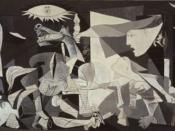"Primitive religion is a name given to the religious beliefs and practices of those traditional, often isolated, preliterate cultures which have not developed urban and technologically sophisticated forms of society." (Long, 1) The term is deceptive in suggesting that the religions of those peoples are somehow less complex than the religions of "advanced", "civilized", or "modern" society.
The term primitive religion unjustly represents a great deal of beliefs and customs that simply cannot be shrink wrapped into one basic category. There is a diverse multiplicity of myths, rituals, and beliefs among the various "primitive" religions throughout the world. However, most primitive religions share some interesting characteristics.
"The sense of a living power underlying all forms of life, referred to as either mana or animism by European scholars" (Winckel, 13) is a belief shared by most primitive religions. "Mana is a sacred force that permeates existence. It is within persons and things, as well as in the universe.
It is a supernatural power that possesses magnetic force." (Winckel, 13) The term most often used within primitive cultures for this force usually translates to "Great Spirit."
A great deal of significance is placed on the soul as a central force to many primitive religions. Peter Paul of the Maliseet tribe in New Brunswich reinforces this, "An Indian, as far as religion goes, he lived his religion. He didn't have to go to church to be told just how to live. Everyday life was his religion." (Winckel, 19) An Eskimo known as Ikinilik adds, "The only thing of value in a man is the soul. That is why it is given everlasting life, either in the land of the sky or in the underworld. The soul is man's greatest power; it is the soul that makes us human, but how it does so...


